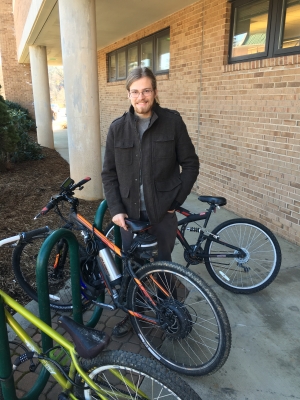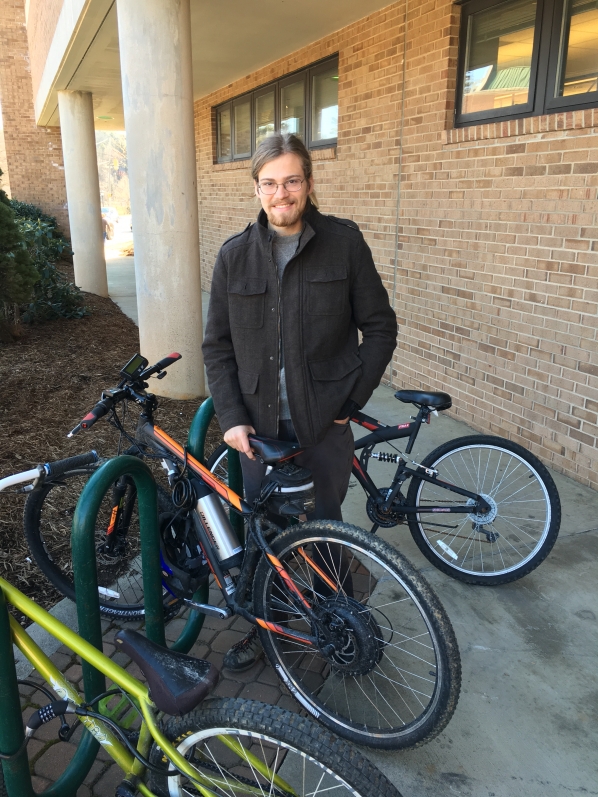Boone—Ryan Gillespie has big ideas to improve the commuter experience in Boone. Gillespie, a senior Sustainable Technology major in the College of Fine and Applied Arts, is passionate about what he calls “responsible transportation.” His goal is to help revolutionize the way citizens commute by studying how a small group of students, faculty and staff use electric bikes over a 6-month period, and apply this data to facilitate a local e-bike rental service.
The electric bike is similar to a standard bicycle in that the rider retains the ability to pedal, but it also includes a motor to help propel riders. By pedaling and motoring, riders can bike more than 25 miles per hour. The e-bike isn’t a new invention, but the clunky, older versions had limited performance due to battery technology. It’s only been in the last few years that technology has allowed for powerful, lightweight e-bikes that are ideal for commuting. The e-bikes used in this study are powered by rechargeable lithium batteries, which provide a simple and sustainable energy source.
An Atlanta native, Gillespie received a bit of a shock when he arrived in Boone. “It’s a very hilly place and for someone who isn’t used to that type of cycling, it can be intimidating,” he said. “The e-bike allows a rider to go farther, and uphill, without the exertion of standard cycling.” This is ideal for a town like Boone, where changes in elevation are common, and likely commuters can be put off by the physical exertion of riding a bike to work or school.
Over the last year Gillespie has received four grants from the Office of Student Research at Appalachian State and used the funds to build a test e-bike. In January he and fellow students Nicholas Stover and Michael Duignan were awarded an additional $2,000 from the Clinton Global Initiative to build two more bikes and conduct a usage study.
Their objective is to measure usage data—including speed, distance, power use and GPS location—and compare this information with participants’ preferred methods of transportation. They will then quantify carbon emissions offset by bike use.
Gillespie anticipates that the findings will be enough to convince the town, the university or both to adopt some form of e-bike rental service. The Boone Community Bicycle Collective (BCBC) and the Renewable Energy Initiative (REI) have expressed interest in exploring the feasibility of renting e-bikes to students, faculty, staff and members of the community.
“I bike a few dozen miles per month on average, and that’s just using a bike for my daily transportation needs,” said Gillespie. “If e-bike rentals take off, we could offset emissions, encourage physical activity, clear cars from the roads and spend more time enjoying the outdoors.”
The first round of usability data will be shared at the Clinton Global Initiative’s Conference at UC Berkeley April 1–3. From there, the study will continue through July. Gillespie will then propose that the REI purchase a fleet of 12 e-bikes to have available on campus in the near future.
Once the study wraps up, one e-bike will be donated to the BCBC, and the other to the Department of Sustainable Technology. To learn more, visit http://www.facebook.com/boonecommunitybikecollective.

